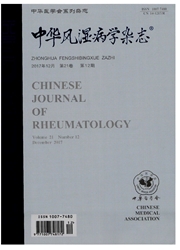

 中文摘要:
中文摘要:
目的检测类风湿关节炎(RA)患者血清中诱骗受体3(DcR3)的水平,分析其在RA中的临床意义。方法收集RA患者血清180例,健康对照者100名,骨关节炎患者29例,系统性红斑狼疮(SEE)患者60例,干燥综合征(SS)患者30例,采用双抗体夹心酶联免疫吸附试验(ELISA)测定血清中的DCR3水平,并分析血清DcR3水平与RA各临床和实验室指标的相关性,计量资料的比较采用独立样本t检验,计数资料比较采用r检验,相关性分析采用Spearman相关分析。结果RA患者血清DcR3水平为(202±261)ng/ml,显著高于健康对照组[(32±31)ng/ml,t=5.33,P〈0.01],0A患者[(90±33)ng/ml,t=1.998,P〈0.01],SLE患者[(41±56)ng/ml,t=3.19,P〈0.01]和SS患者[(25±31)ng/ml,t=2.50,P〈0.01];根据健康人和其他疾病对照确定DcR3的诊断浓度为45.86ng/ml,敏感性为0.991,特异性为0.765。血清DCR3水平与类风湿因子(RF)IgM、RF.IgG、抗环瓜氨酸肽(CCP)抗体呈正相关(r值分别为0.58,0.54,0.411,P〈0.05),与补体c3(c3)呈负相关(r=0.226,P〈0.05)。结论DCR3在RA患者血清中表达增高,并与疾病免疫指标密切相关(包括RF-IgM、RF—IgG、C3和抗CCP抗体),可能是RA预后不良因素之一。
 英文摘要:
英文摘要:
Objective To test serum decoy receptor 3 (DCR3) concentration in patients with rheumatoid arthritis (RA), and analyze its clinical significance. Methods The serum from 180 RA patients, 29 osteoarthritis (OA) patients, 60 systemic lupus erythematosus (SLE) patients, 30 Sjogren's syndrome (SS) patients and 100 healthy donators were selected. The serum DcR3 concentrations of the two groups were detected by enzyme-linked immunosorbent assay (ELISA). The correlation between serum DcR3 levels and clinical features of patients with RA were investigated. T test, X^2 test and Spearman's correlation analysis were used for statistical analysis with software SPSS 16.0. Results Serum DcR3 levels in RA patients [ (202±261) ng/ml] were significantly higher than those of the healthy controls [(32±31) ng/ml, t=5.33, P〈0.01 ], OA patients [(90±33)ng/ml, t=1.998, P〈0.01], SLE patients [(41±56)ng/ml, t=3.19, P〈0.01], and SS patients [(25±31) ng/ml, t=2.50, P〈0.01]. The DcR3 cut value was 45.86 ng/ml for the diagnoses of RA, the sensitivity and specificity was 0.991 and 0.765 respectively. The levels of serum DcR3 in RA patients were related with rheumatoid factor (RF) IgM, RF-IgG, anti-cyclic citrullinated peptide antibodies (anti-CCP) and C3. Conclusion Serum DcR3 level is significantly elevated in RA and it is significantly associated with immunological index of RA including RF-IgM, RF-IgG, C3 and anti-CCP antibody, which may be a factor for unfavorable prognosis of RA patients.
 同期刊论文项目
同期刊论文项目
 同项目期刊论文
同项目期刊论文
 Umbilical cord mesenchymal stem cells inhibit the differentiation of circulating T follicular helper
Umbilical cord mesenchymal stem cells inhibit the differentiation of circulating T follicular helper Enhanced Apoptosis and Senescence of Bone-Marrow-Derived Mesenchymal Stem Cells in Patients with Sys
Enhanced Apoptosis and Senescence of Bone-Marrow-Derived Mesenchymal Stem Cells in Patients with Sys 期刊信息
期刊信息
